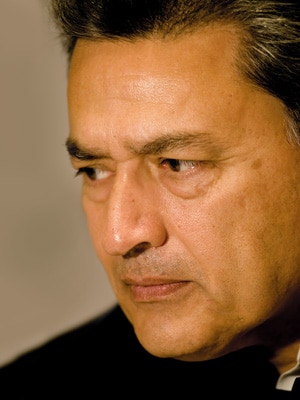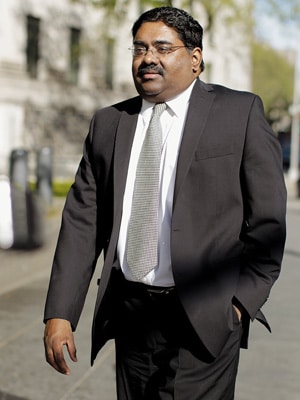
Rajat Gupta Crossed The Fine Line
Whether Rajat Gupta is guilty of insider trading or not is for the courts to decide. For many who know him, his actions were unethical
Few gods in the pantheon of corporate America were as exalted as Rajat K. Gupta, who was revered as much for his decency and discretion as his brilliance and business chops.
Now the 62-year-old ex-head of McKinsey & Company, who has stepped down as director from the boards of Goldman Sachs, Proctor & Gamble, AMR Corp. (the parent company of American Airlines) and the Bill & Melinda Gates Foundation, is fighting to defend his reputation. It’s a formidable battle in the land that set the stage for his ascent.
Whether Gupta is guilty or not of the insider trading allegations by the US Securities & Exchange Commission (SEC) is for the legal system to determine. That he is in moral disgrace and tainted in the eyes of those who once were friends and admirers is amply clear by their anguish
and contempt.
“How do you start a conversation with him? Do you say you’re sorry this happened or do you say, son-of-a bitch, look what you did?” asks Kanwal Rekhi, managing director of California-based Inventus Capital Partners and a friend of Gupta’s for 20 years.
Rekhi says he stuck his neck out defending Anil Kumar, Gupta’s close friend and McKinsey protégé, when the news organisation Bloomberg called on the heels of SEC’s charges against Kumar, who was a director at McKinsey and a consultant at Galleon Management hedge fund. The regulator alleged that he passed on confidential information about McKinsey clients to Galleon founder Raj Rajaratnam.
“I defended Anil tooth and nail and felt very let down when he pleaded guilty. So when Bloomberg called me about Rajat, this time I refused to comment. He and Anil were so tight and Anil had confessed,” Rekhi says.
The tide of public opinion turned against Gupta upon the release of a nearly 19-minute wire-tap conversation between him and Rajaratnam, which prosecutors played this March 15 at Rajaratnam’s trial. Currently on bail, Rajaratnam was found guilty on all 14 counts of securities fraud and conspiracy. The SEC alleged that the conversation was one of several revealing exchanges between the two in 2008.
The tape revealed that during the course of a casual conversation, Gupta told Rajaratnam that Goldman was considering the possibility of acquiring Wachovia or the American International Group.
“The damage has been done to Rajat because of the tape. Whether he is proven guilty or not, he has shown moral turpitude. He was so loose with Goldman’s confidence,” Rekhi says.
During the course of that taped conversation, Rajaratnam spoke disparagingly of Anil Kumar, stating that he was paying Kumar for doing nothing. “Instead of showing moral outrage toward Rajaratnam that he was giving money to Anil, Rajat implied that Anil should have been more grateful,”
Rekhi says.
Looking back, Rekhi recalls a negative trait about Gupta that suggested there was more to the man than meets the eye. “It was worrisome how Rajat always wanted to be centre stage at events such as those organised by Pan-IIT, which is a labour of love. If he didn’t get the spotlight, he often did not participate. But the lack of character and moral fibre — based on the taped conversation — wasn’t the Rajat I knew,” he says.
The SEC, this March 1, filed a civil lawsuit against Gupta on the grounds that he disclosed material information obtained as a member of the board of directors at Goldman and P&G. The charges are that Gupta disclosed to Rajaratnam news of Berkshire Hathaway Inc.’s $5 billion investment in Goldman before it was publicly announced, as well as Goldman and P&G’s financial results.
The lawsuit alleges that Rajaratnam caused Galleon hedge funds to trade based on Gupta’s information about Goldman, generating profits and loss avoidance of over $17 million, and also trade on P&G information, generating profits of over $570,000. The alleged events took place between June 2008 and January 2009. Gupta’s trial is set to begin on July 18. However, as these cases go, there is a possibility that the hearing may get postponed.
Gupta, who on March 18 filed a counter lawsuit against the SEC, declined through his representative to be interviewed for this article. Instead, the representative provided a statement from Gary P. Naftalis, Gupta’s counsel in New York. Here is an excerpt.
“Mr. Gupta has done nothing illegal. There is no allegation that Mr. Gupta traded in any of these securities or shared in any profits as part of any quid pro quo. In fact, Mr. Gupta had lost his entire $10 million investment in the GB Voyager Fund managed by Rajaratnam at the time of these events, negating any motive to deviate from a lifetime of honesty and integrity.”
However, the larger question is not whether Gupta made money or not — that is for the court to determine. The issue is his credibility and whether his behaviour crossed the ethical line for a board member. In that regard, the Rajaratnam trial released some stink for Gupta.
During the trial, Goldman CEO Lloyd Blankfein said Gupta had violated the corporation’s confidentiality policy. Stuart Diamond, professor of legal studies and business ethics at the Wharton School of Business, says Gupta should have erred on the side of caution. “It would have been better if he had not opened his mouth. If you’re in a position where disclosure of information is risky, why take that risk?” asks Diamond.
Lynn Stout, professor of corporate and securities law at University of California, Los Angeles, says civil charges of this nature are quite severe because of the potential damage to credibility.
“It’s not merely about fees and penalties, there’s reputation involved. And the timing [of one of Gupta’s calls to Rajaratnam, just 23 seconds after a Goldman board conference, according to the SEC] is extremely suspicious and the SEC was right to investigate,” she says. Within a minute after their conversation, the SEC alleged, Rajaratnam caused Galleon tech funds to purchase more than 175,000 additional Goldman shares.
Vivek Wadhwa, senior research associate at Harvard Law School, says he has no words of support.
“He may or may not be guilty, but there is no forgiveness for his obvious lapse of ethics. He had no business talking to anyone after a board meeting, leave alone the head of a hedge fund. It’s shameful. I thought he was far, far higher than this,” Wadhwa says.
Why would a man of Gupta’s calibre risk his reputation so carelessly?
Wadhwa believes it’s the age-old story of trying to keep up with the Joneses, which in Gupta’s case is his IIT reference group.
“I think he thought it was time to get ahead. There’s a tremendous pressure within this group to keep up and some people don’t know when to stop,” he says.
But no matter which way you look at it, nobody who knew Gupta saw this coming.
“I think Rajat is very smart, very thoughtful, very considerate, able to accommodate stakeholders’ perspectives and make events happen. The McKinsey partners loved him, people respected him, so let’s not judge him before the court does,” says Nitin Mehta, a California-based private investor and Gupta’s friend and former colleague at McKinsey, Europe. When asked how Gupta was holding up, Mehta said he had not spoken to him since the allegations.
Manoj Goel, co-founder of the IIT Roorkee Heritage Fund in California, interacted with Gupta as a former committee member at the alumni network, Pan-IIT.
“He was very spiritual and often quoted the Gita in Sanskrit, like when he interviewed Bill Gates at an event. The man I saw at Pan-IIT and the man portrayed by the SEC appear to be different. But then, people have a dark side,” Goel says. “I can’t imagine what could have led him [to this situation] — power, ego, or maybe just being able to get away with it.”
Chika Onyeani, publisher of African Sun Times in New Jersey, was an invitee at Gupta’s daughter’s wedding at his Connecticut residence in 2008. She married the son of Onyeani’s friend, a Nigerian diplomat.
“It was a grand wedding. But for all his wealth and connections, I thought Gupta was humble. He wasn’t throwing his weight around,” Onyeani recalls.
Navneet S. Chugh, an attorney at The Chugh Firm in California, has known Gupta for 15 years. “He has always been very good. He helped over a dozen non-profits,” Chugh says.
In fact Naftalis, Gupta’s lawyer, drew attention to his client’s non-profit work in his statement to Forbes India: “Mr. Gupta has had a 40-year career based on ethical conduct and integrity, and has served with distinction and selflessness many philanthropic and civic causes around the world, including in the United States and India.”
When asked whether a person’s background and charitable work, which is indicative of his goodness, is taken into consideration when filing charges, SEC’s Sanjay Wadhwa, deputy chief, Enforcement Division (Market Abuse Unit), and associate regional director for Enforcement, New York Region, says: “SEC actions do not represent the agency’s views as to whether a defendant is a ‘good’ person or a ‘bad’ person, but simply that, in light of the facts alleged, the agency has determined that the person has violated securities laws and must be held accountable for his or her wrongful conduct.”
Despite his contributions to corporate America and to various charitable causes, words of support for Gupta were hard to come by for this article.
Ex-McKinsey heavyweight Tom Peters, through his representative, declined to comment. Several former fellow board members including those at the Bill & Melinda Gates Foundation and US-based governing board members at the Indian School of Business (which Gupta co-founded with Kumar) did not respond to requests for interviews. A policy director at the US-India Business Council headquartered in Washington, D.C., said the organisation had decided not to comment about Gupta, its past chairman.
Bala V. Balachandran, professor emeritus in service at the Kellogg School of Management, said in an e-mail: “We go back a long way and I don’t want to pass any comments or judgments on a public platform.”
To many, Gupta seems contaminated by association. His biggest mistake so far appears to be his pillow talk with Rajaratnam. But if it was not for money, then did he merely brag? What could possibly have led Gupta, of all men, to be so easy with his tongue?
“Behind Gupta’s fabulous riches, power and fame was a life clearly falling apart. It seems that he lacked inner fulfilment,” speculates Ron Robins, a North America-based ethical investment consultant. Deepak Kamra, general partner at Canaan Partners, California, has met Gupta at several public events and believes that he is made of better stuff than Rajaratnam or Bernard Madoff. “Unlike them, I don’t think he was motivated to do something crazy for money. It’s not even clear he made money off it — that’s for the court to decide,” Kamra says. “But I can’t imagine what more a mortal could want after being at the pinnacle of McKinsey. What else is there, besides maybe running a country?”
If it was not for money, then did Gupta merely brag? What led him to be so easy with his tongue?
(This story appears in the 30 November, -0001 issue of Forbes India. To visit our Archives, click here.)






